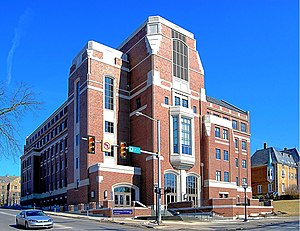Ford School of Public Policy
 |
|
| Type | Public |
|---|---|
| Established | 1914 |
|
Parent institution
|
University of Michigan |
| Dean | Michael S. Barr |
|
Academic staff
|
50 |
| Students | 126 |
| Location | Ann Arbor, Michigan, U.S. |
| Campus | Urban |
| Affiliations | APSIA |
| Website | www |
The Gerald R. Ford School of Public Policy, often referred to as the Ford School, is a leading public policy school at the University of Michigan. Founded in 1914 to offer training in municipal administration, in 1999 the school was named after former President Gerald Ford, who graduated from the University of Michigan in 1935. In the latest U.S. News & World Report rankings, the Ford School was ranked #1 in social policy (tied with Harvard University), #3 in public policy analysis, #5 in environmental policy and management and health policy and management, and #9 in information and technology management.
The Ford School offers wide-ranged research in public policy and is known for its strong quantitative orientation. The school runs dual degree programs with the University of Michigan Law School, Ross School of Business, Taubman College of Architecture and Urban Planning, School of Information, School of Social Work, School of Natural Resources and Environment, and School of Public Health, as well as the Departments of Economics, Sociology, and Political Science.
The Ford School was founded in 1914 and offered the nation's first formal graduate degree for aspiring public servants. It was part of the Progressive Era movement for clean government and well-trained professional civil servants. For the first half-century of its existence, the institute focused on training individuals who would serve in state and local government in the United States.
In 1936, the program became the Institute of Public and Social Administration. In 1946, it became the Institute of Public Administration. In the mid-1960s, academic work in the social sciences suggested that the analytic methods of the social sciences could be usefully applied to the understanding of public concerns. The institute, which was renamed the Institute for Public Policy Studies in 1968, redesigned its curriculum to include rigorous training in the social sciences, particularly quantitative analysis of economic, political, and organizational questions. The focus of faculty research and student training moved to national and international issues.
...
Wikipedia
